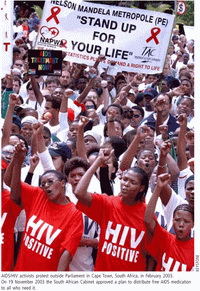Health Minister Calls South Africa to Unite against HIV
South Africa has one of the world's highest HIV prevalence rates, with an estimated 10.6 percent of its 49 million people infected, government data shows. On average 29.3 percent of pregnant women who sought treatment at public health facilities last year were HIV-positive, a health department survey found.

South Africa is reviewing its AIDS treatment programs and encouraging people to get tested for HIV as it seeks to reverse years of government neglect of the disease, Health Minister Aaron Motsoaledi said.
"We are at war with HIV," Motsoaledi told reporters in Cape Town today. "We need to plan the biggest voluntary counseling and testing program ever seen in the world" and ensure AIDS patients get access to treatment sooner.
South Africa 's AIDS epidemic ballooned under former President Thabo Mbeki, who questioned the effectiveness of scientifically proven drugs and refused to be tested in public for HIV. President Jacob Zuma's administration, which took office in May, has made combating AIDS a priority, Bloomberg reports.
Motsoaledi said the figures called for a "massive change in behaviour and attitude" toward Aids among South Africans.
"On the figures, it's shocking. As to whether it has been affected by what we did in the past 10 years, to me that's obvious," he said, according to the South African Press Association.
"I don't think we'd have been here if we'd approached the problem in a different way," he said. "It's a really obvious question. Yes, our attitude toward HIV/Aids put us here where we are."
Most Aids-related deaths were among young people, especially women, he said. About 57% of child deaths in 2007 were HIV-related, the minister added, Mail & Guardian Online reports.
It was also reported, Motsoaledi said his department would approach sports, business, entertainment and religious leaders to undergo testing, adding that both the President and the Cabinet had agreed that having a strategy of leading by example was the best way forward.
He believed it was possible to reverse the rate of infections and highlighted the case of the Western Cape which had seen a reduction in the number of early childhood deaths after introducing dual therapy in 2003.
"I still believe South Africans can unite and stand together against this disease," he said, adding that prevention remained the key focus for government in its fight against the pandemic, BuaNews Online reports.
Subscribe to Pravda.Ru Telegram channel, Facebook, RSS!


